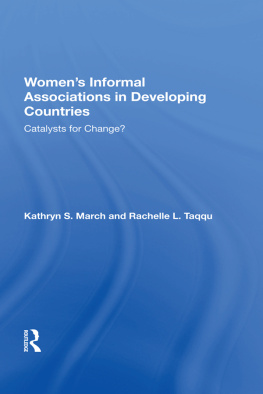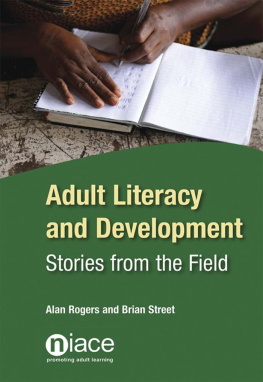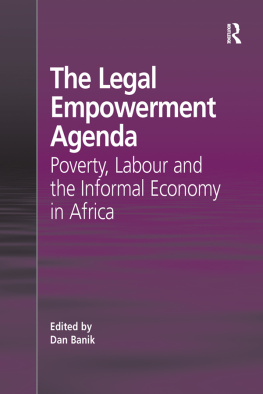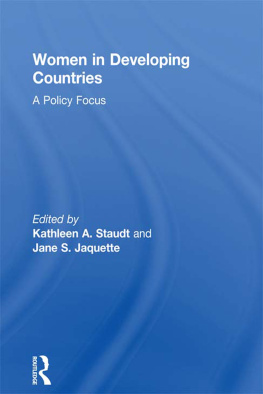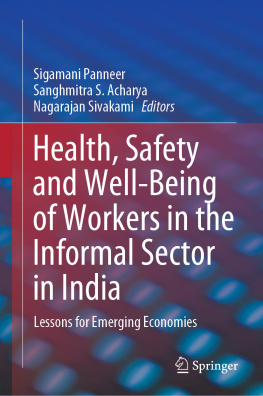About the Book and Authors
Informal associations among women in developing countries constitute an important source of vitality and integrity for women. This book evaluates the impact of development programs on womens informal associations and sharpens our understanding of them. The participation of women in development via their informal networks presents a dilemma insofar as intervention by development organizations into the informal sphere often forces women to use their associational resources defensively and, at times, even insulates them from development itself. The authors look at credit, labor, ritual, and religious associations; compare structures; describe differences; and assess the capacity of these womens organizations to make use of developmental assistance. They conclude that mobilizing existing associations is often an inappropriate development strategy, and they advise the creation of new associations by analogyusing knowledge of informal organizational structures to generate new groups modeled after the old.
Kathryn S. March is assistant professor of anthropology, womens studies, and Asian studies at Cornell University and is a fellow at Mary Ingraham Bunting Institute, Radcliffe College. Rachelle L. Taqqu received her MBA from the Cornell Graduate School of Management and has taught at both Stanford and Cornell universities.
First published 1986 by Westview Press
Published 2018 by Routledge
52 Vanderbilt Avenue, New York, NY 10017
2 Park Square, Milton Park, Abingdon, Oxon OX14 4RN
Routledge is an imprint of the Taylor & Francis Group, an informa business
Copyright 1986 by Kathryn S. March and Rachelle L. Taqqu
All rights reserved. No part of this book may be reprinted or reproduced or utilised in any form or by any electronic, mechanical, or other means, now known or hereafter invented, including photocopying and recording, or in any information storage or retrieval system, without permission in writing from the publishers.
Notice:
Product or corporate names may be trademarks or registered trademarks, and are used only for identification and explanation without intent to infringe.
Library of Congress Cataloging in Publication Data
March, Kathryn S.
Womens informal associations in developing countries.
Bibliography: p.
Includes index.
1. Womens networksDeveloping countries. I. Taqqu,
Rachelle. II. Title.
HQ1870.9.M37 1986 305.4091724 84-19664
ISBN 13: 978-0-367-21405-0 (hbk)
In most parts of the developing world, the major benefits of economic growth have failed to reach women. Women have also paid a steep price for the modest glimmerings of modernity that have reached them. In different places around the world, womens labor obligations have multiplied, their independent resources have shrunk, and their autonomy and cultural worth have often diminished as development has unfolded.
Failure to develop womens resources and skills undermines development as a whole. Womens labor, whether paid or unpaid, is essential. Women everywhere are primary caregivers for their families and children. Decisions women make and skills women have materially affect the health, nutrition, attire, cleanliness and emotional equanimity of all family members. With the sharpening recognition that development hinges on the fulfillment of basic human needs and the quality of life, as well as on the transfer of capital and technology, women have at last found their way onto the international development agenda. (But the resolution of these problems has barely taken shape.)
Effective programs demand accurate and detailed information about what women do: where and how they work, with whom they cooperate or compete; how they help support their households; what resources they control and how they exert that control; in what ways they make or influence decisions and shape community opinion. Existing ideologies about the sexual division of labor, or power, cannot accurately guide the collection of this information. Most recent portrayals of womens lives cross-culturally have in fact differed vastly from assumptions about what women ought to be doing. Conventional wisdom about the powerlessness or passivity of women seldom reflects the patterns of work and structures of authority that actually prevail.
In studying the range in womens socio-political actions and economic contributions, one avenue of investigation has led from an interest in the sexual division of labor to analysis of the household economy as a basic unit of production. Such research, although concerned primarily with womens contributions, converges with an older and recently resuscitated field of economic analysis. Studies of the household economy frequently explore precise patterns of labor allocation within the household and can thus help strip away ideological blinders to womens actual economic contributions at the household and community level. Because such studies often assess the articulation of the household economy to wider economic opportunities and demands, they have the further advantage of placing womens productive and reproductive activities within a larger economic context and of revealing the complementarity of womens and mens roles. Generally, then, their conclusions can be framed in terms of broader policy recommendations.
Parallel to household economics is the growing but uneven field of family studies. Concerning women in development, many family studies have aimed to bring further insights about social values as they are shaped by the family, womens options as the family defines them, and the relationship of both values and options to production patterns. Household and family studies are more or less distinct if overlapping fields of investigation, with the household more rigorously defined as a locus, not for sentiment or kinship obligations, but for production and reproduction. As analytical prisms for understanding social action, both family and household have proved useful, not least because each can also be seen as an important nexus between the economy on one hand and socio-political organization on the other.
As central organizing concepts for understanding the experience or position of women, however, both approaches are insufficient. Neither as a place of work nor as a hub of emotional life is the household or the family the sole site of womens activities or culture. Even if we limit ourselves strictly to womens most tangible, or instrumental, social contributions, an exclusive focus on the household economy will produce an incomplete and distorted picture. It ignores other forms of extra-domestic and extra-familial relationships, which vitally shape womens experiences, and which, in a wide variety of settings, consist largely of single-sex associations. The study of women cross-culturally has shown that womens associations with one another are as important for women as same-sex associations are for their men, and that both types of association typically animate the life of a community. Residual dogmas ordaining womans place to be in the home should not blind us to these additional sources of social, political, and economic energy.
Anthropologist Maher has dubbed the casual, daily relationships among women the woman network (1974). This, she says, is not some hypothetical web that links allwomen in mysterious solidarity, but an institution, like kinship or marriage, that affects most peoples lives (1974:53). What Maher has observed in Morocco holds true in many if not most developing areas, including places where the womens world is less segregated than it is in North Africa. Through their associations with one another, women not only develop a shared identity, but they widen their options.

